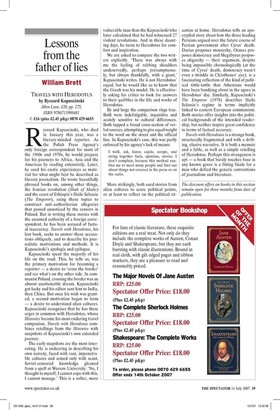Lessons from the father of lies
William Brett TRAVELS WITH HERODOTUS by Ryszard Kapuscinski Allen Lane, £20, pp. 275, ISBN 9780713998481 £16 (plus £2.45 p&p) 0870 429 6655 Ryszard Kapuscinski, who died in January this year, was a literary-minded reporter. As the Polish Press Agency's only foreign correspondent for most of the 1960s and 1970s, he would prepare for his journeys to Africa, Asia and the Americas by reading extensively. Later, he used his exotic experiences as material for what might best be described as literary journalism. He wrote beautifully phrased books on, among other things, the Iranian revolution (Shah of Shahs) and the court of Ethiopia's Haile Selassie (The Emperor), using these topics to construct anti-authoritarian allegories that passed unnoticed by the censors in Poland. But in writing these stories with the assumed authority of a foreign correspondent, he has been accused of factual inaccuracy. Travels with Herodotus, his last book, seeks to answer these accusations obliquely, and to describe his journalistic motivations and methods. It is Kapuscinski's apologia and epilogue.
Kapuscinski spent the majority of his life on the road. This, he tells us, was the primary motivation for becoming a reporter — a desire to 'cross the border' and see what's on the other side. In communist Poland, crossing the border was an almost unattainable dream. Kapuscinski got lucky and his editor sent him to India, then China. But once his wish was granted, a second motivation began to form — a desire to understand alien cultures. Kapuscinski recognises that he has these urges in common with Herodotus, whose Histories became his most enduring travel companion. Travels with Herodotus combines retellings from the Histories with snapshots of Kapuscinski's own extended journey.
The early snapshots are the most interesting. He is endearing in describing his own naivety, faced with vast, impenetrable cultures and armed only with scant, Soviet-censored knowledge gleaned from a spell at Warsaw University. 'No, I thought to myself, I cannot cope with this, I cannot manage.' This is a softer, more vulnerable man than the Kapuscinski who later calculated that he had witnessed 27 violent revolutions. And in these daunting days, he turns to Herodotus for comfort and inspiration.
We are asked to compare the two writers explicitly. 'There was always with me the feeling of rubbing shoulders undeservedly, perhaps presumptuously, but always thankfully, with a giant,' Kapuscinski writes. He is not Herodotus' equal, but he would like us to know that the Greek was his model. He is effectively asking his critics to look for answers to their quibbles in the life and works of Herodotus.
By and large the comparison rings true. Both were indefatigable, inquisitive and acutely sensitive to cultural differences. Both tapped a broad cross-section of verbal sources, attempting to give equal weight to the word on the street and the official line. In Kapuscinski's case, this was partly enforced by his agency's lack of means: I walk, ask, listen, cajole, scrape, and string together facts, opinions, stories. I don't complain, because this method enables me to meet many people and find out about things not covered in the press or on the radio.
More strikingly, both used stories from alien cultures to score political points, or at least to reflect on the political situation at home. Herodotus tells an apocryphal story about how the three leading Persians argued over the future course of Persian government after Cyrus' death. Darius proposes monarchy, Otanes proposes democracy and Megabyzus proposes oligarchy — their argument, despite being impossible chronologically (at the time of Cyrus' death, democracy wasn't even a twinkle in Cleisthenes' eye), is a fascinating reflection of the kind of political tittle-tattle that Athenians would have been bandying about in the agora in Herodotus' day. Similarly, Kapuscinski's The Emperor (1978) describes Haile Selassie's regime in terms implicitly linked to eastern European communism. Both stories offer insights into the political backgrounds of the intended readership, but neither inspire great confidence in terms of factual accuracy.
Travels with Herodotus is a strange book, structurally fragmented and with a drifting, elusive narrative. It is both a memoir and a fable, as well as a simple retelling of Herodotus. Perhaps this strangeness is apt — a book that barely touches base in any known genre is a fitting finale for a man who defied the generic conventions of journalism and literature.
The discount offers on books in this section remain open for three months from date of publication.

















































 Previous page
Previous page